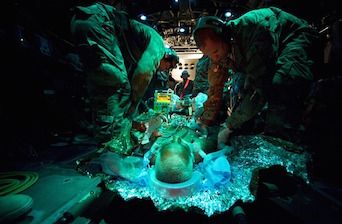STATE NEWS: Maryland Rescue Workers Will Soon Be Able to Treat Animals
Without a veterinary license, it is illegal to give medical care to animals. But Maryland recently passed a bill giving emergency responders immunity to this rule.

According to most state laws, giving medical care to animals without a veterinary license is punishable by a fine or even jail time. But Maryland lawmakers recently passed a bill giving a certain group of people immunity to this rule.
First responders in the state can now provide emergency medical aid to animals—according to a bill that follows in the footsteps of similar bills in Ohio, passed last year, and Colorado, passed in 2014. In all, 22 states now allow emergency crews to provide aid to animals without recrimination.
Del. Clarence Lam (D) is the sponsor of the new legislation, which is expected to be signed by Maryland Gov. Larry Hogan (R) with ease due to the wide approval from the public and animal advocacy groups. While no first responder has ever been prosecuted or sued for this offense, the chance is still there without this new bill.
Lisa Radov, chairwoman of the political action committee Maryland Votes for Animals, which advocated for this new bill, said emergency responders are already giving medical care to animals. “I began asking around to firefighters and different first responders,” Radov said. “They didn’t realize that what they were doing was against the law.”
[RELATED: Misrepresenting Service Animals May Soon Be Illegal In Massachusetts]
The similar Ohio bill came about after paramedics became aware they couldn’t legally give naloxone, an opioid antidote, to police K9 dogs. These dogs were often inhaling and ingesting dangerous narcotics on drug raids and had to be rushed to the veterinarian to receive the naloxone. With the addition of the new bill, county sheriff dog handlers now carry the drug on them so they can give it to these overdosing dogs on the spot, saving their lives.
Responders also find themselves needing to give mouth-to-snout resuscitation and administer oxygen masks to animals rescued from fires or other emergency situations.
This bill will allow emergency responders to do their job without feat of punishment, and will hopefully spark other states to employ the same law. “It’s very important that we protect our first responders and our pets,” Radov said. “They’re giving up their lives for us, and we want to make sure we protect them as well.”